Children’s Health Defense Hosts Spirited “Moment of Truth” Conference in Austin
November 12 | Posted by mrossol | American Thought, CDC NIH, Coronavirus, Corruption, Health, Law, MAHA, Pushing Back, ScienceGood summary of the conference. I hope individual session recordings or transcripts will be made available. mrossol
Source: Children’s Health Defense Hosts Spirited “Moment of Truth” Conference in Austin
By James Lyons-Weiler, Science and Medicine Reporter, The MAHA Report
From November 7 – 9, the Children’s Health Defense (CHD) held its 2025 national conference, billed as “Moment of Truth,” at the JW Marriott in downtown Austin, Texas. The two-day program, which attracted over 1,000 attendees, featured moderated conversations in the Lone Star Ballroom, with Stephanie Locricchio and Michael Kane the event’s emcees.
Panel discussions featured a cross-section of MAHA-aligned doctors, policy makers and personalities – including Russell Brand and Cheryl Hines – and others fighting for medical freedom and transparency from within the government, such as Senators Rand Paul and Ron Johnson.
One first day panel was “Spellers: In Their Own Words,” a first‑person discussion that included nonspeaking individuals using letter boards and keyboards.
Other panelists were Dr. Lawrence B. Palevsky, who addressed ways that pediatric wellness can make children well again; and Florida Surgeon General Joseph Ladapo, who addressed the importance of “right action” in how we conduct ourselves and in policy. During the comment period, Mark Gorton, co-president of the MAHA Institute, said, with tongue-in-cheek, that he was “pretty sure God is an anti-vaxxer”; he urged attendees to stop ceding labels, but rather to state their positions on vaccines unapologetically while pressing forward and making public their injury‑data cases.
The event’s first day closed with a legal roundtable — “Restoring Health Freedom to Our Legislatures and Courts” — during which CHD-affiliated attorneys and allied litigators summarized active censorship, antitrust, and other legal victories.
Among the most promising of these was the preliminary injunction CHD legal counsel and allies won under the Americans with Disabilities Act. The victory allowed a medically frail New York State student to return to public school after being excluded for her entire sophomore year because of a single missing hepatitis-B dose. Both the student and her mother, identified as Ms. Doe, joined the panel to describe the experience and its impact.
Similarly, Leslie Manookian, founder of the Health Freedom Defense Fund (HFDF), recounted the Ninth Circuit’s 2024 reversal in HFDF v. LAUSD, which revived teachers’ and staff challenges to the Los Angeles Unified School District’s COVID-19 vaccine mandate. She also detailed continuing appellate work, including Idaho litigation on medical-freedom statutes and donor-privacy protections, and described HFDF’s role in drafting model legislation now cited nationwide. Her remarks underscored the legal movement’s maturation from reactive defense to proactive policy design.
Other legal matters reviewed at the session included licensing-board prosecutions and hospital-protocol cases, along with Warner Mendenhall’s call for Congress to revisit the PREP Act’s liability shield. Mendenhall asserted that “all hospitals that treated COVID-19 patients broke the law in numerous ways,” urging immediate legislative correction. The discussion closed on a practical note: expanding collaboration among legal teams to pursue parallel cases under administrative, civil-rights, and consumer-protection statutes.
The weekend featured blockbuster remote presentations by Senator Ron Johnson (R-WI) and Senator Rand Paul (R-KY), respectively.
Senator Paul’s session was titled, “Why Isn’t Tony Fauci in Prison?” Paul reviewed his oversight timeline and policy proposals—among them, mandatory disclosure of royalties for federally-funded scientists and new restrictions on what he termed “risky research.”
Paul also memorialized Li Wenliang, stating on X that Li was “the Chinese ophthalmologist who tried to warn his colleagues about COVID-19 and was silenced and punished by the CCP. He later died under suspicious circumstances after being forced to recant his warnings. His story matters because it is part of the truth.”
The session also recapped key claims from Paul’s committee work: September 2019 illness cases at the Wuhan Institute of Virology (WIV); destruction of onsite databases by Chinese officials; October 2019 cell-phone metadata indicating the facility was emptied; and an official report finding that 90,000 wet-market animals tested negative for SARS-CoV-2—facts Paul cited to challenge the natural-origin narrative.
On the matter of illegally funding gain-of-function research at the WIV, Paul further alleged that Dr. Anthony Fauci and former NIH Director Francis Collins used unregistered email servers, destroyed records, and encouraged others to destroy records. Paul reported that Fauci has been referred to the DOJ for lying to Congress, and pointed to Fauci’s retroactive blanket “autopen” signed pardon by President Donald Trump in 2014 exempting gain-of-function research. Paul wondered why, if Fauci had done no wrong, did he accept the pardon. His talk concluded by advocating for a new “Risky Research Bill” (S.854, Risky Research Review Act) which aims to end any pathogen-enhancement funding without civilian oversight and mandated public disclosure of scientist royalties. “I don’t want another Anthony Fauci to take the reins of government and fund this dangerous research, ever,” Paul quipped.
Paul also urged Congress to stop hepatitis B vaccinations in newborns and COVID-19 vaccines in children—positions he characterized as “all risk, no benefit” to that population.
Senator Ron Johnson’s panel, titled “Uncovering the Truth: The Lonely Search in the Senate” began by celebrating recent successes, noting that COVID-19 vaccine uptake has fallen to extremely low levels and framing this as evidence that “people are finally seeing through the narrative.” A sane society, he said, is one that admits when it is wrong – which is not what ours has done: both physicians and policymakers remain hesitant to confront how their own actions may have put others at risk. Johnson described ongoing work to document the failure of accountability through hearings and direct dialogue with clinicians.
Johnson recounted a committee exchange with Senator Blumenthal, who had claimed to know no one harmed by Obamacare; in reality, Johnson said, “their own witness was the one harmed.” He used that story to illustrate institutional blindness that he believes also characterizes public-health leadership. The senator paused to apologize to physicians whose careers were damaged after testifying in his hearings and to thank those who “stood for truth when there was a price.” He announced plans for a new round of hearings on the destruction of medical careers and referenced a case involving hospital protocols and consent, led by attorney Ralph Lorigo, where families were barred from seeing loved ones or securing alternative treatments. He linked this to broader issues of transparency, alleging that eight million pages of federal records remain buried, and citing the ongoing inquiry into Dr. David Morens’s use of private email accounts for NIH business and attempts to evade FOIA requests as examples of how information is concealed.
Johnson also discussed the Henry Ford Health System study, criticizing what he called mischaracterizations of its findings and singling out Dr. Jake Scott for his public commentary, calling him “a piece of work.” He asked the audience to assist with a hearing on hospital protocol failures and to support Dr. Paul Thomas, whose case he described as symbolic of the professional reprisals facing dissenting physicians. In closing, Johnson raised questions about alternative therapies such as DMSO and chlorine dioxide, referenced Dr. Stanislaw Burzynski’s earlier research, and criticized what he called the “capture” of the national health commission for its treatment of hydroxychloroquine and ivermectin. He ended by reaffirming his mission: to help Americans recognize that corruption in medicine and government is real and must be confronted openly before it becomes irreversible.
Both Sen. Paul and Johnson presented remotely due to their efforts to end the government shutdown.
Russell Brand and Cheryl Hines
For many, the highlight of the event was the sometimes serious, frequently funny dialogue between comedian and actress Cheryl Hines and comedian and actor Russell Brand – held during the dinner portion of the event, in the Lone Star Ballroom. Topics ranged from the challenges of making high‑stakes medical decisions while raising children, to Hines’s readiness to defend her husband, HHS Secretary Robert F. Kennedy Jr., on such shows as ABC’s The View.
She also recounted her early years in comedy—how she found her footing in clubs and ensembles—before turning to her new memoir, Unscripted, published by Skyhorse on Nov 11, 20025.
Hines and Brand spoke on a makeshift stage in front of a large styrofoam poster of Hindes’ “Unscripted.:” Above the book’s title were these words: “HELP MAKE THIS BOOK A NYT BESTSELLER.”
At one point, Brand, a natural pitch man, took the opportunity to implore everyone in the audience to buy four copies of Hines’ book, as “an act of rebellion and advocacy.”
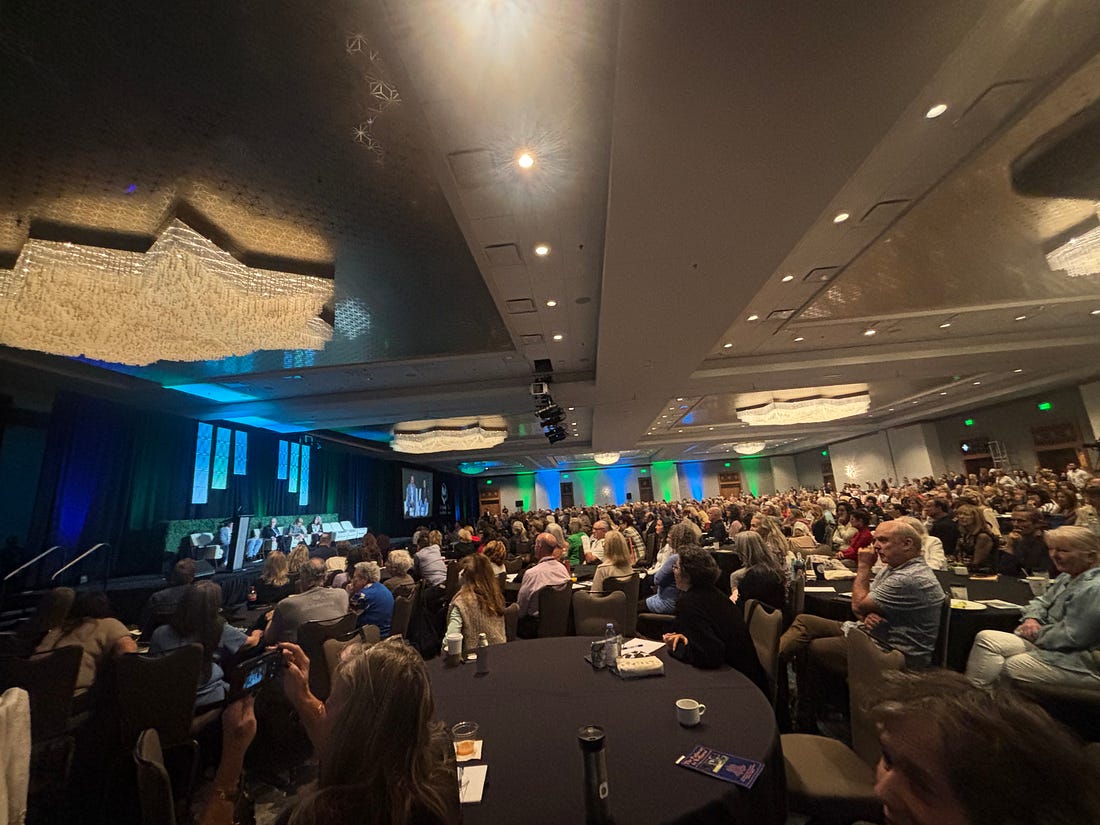

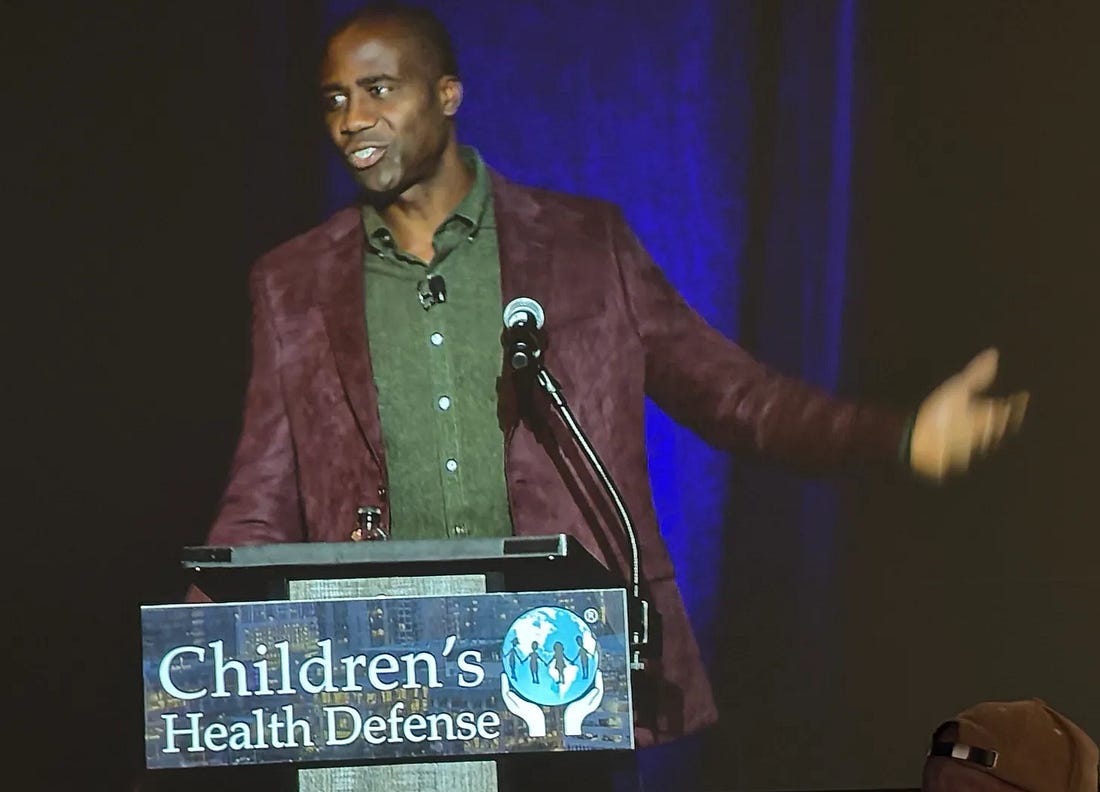
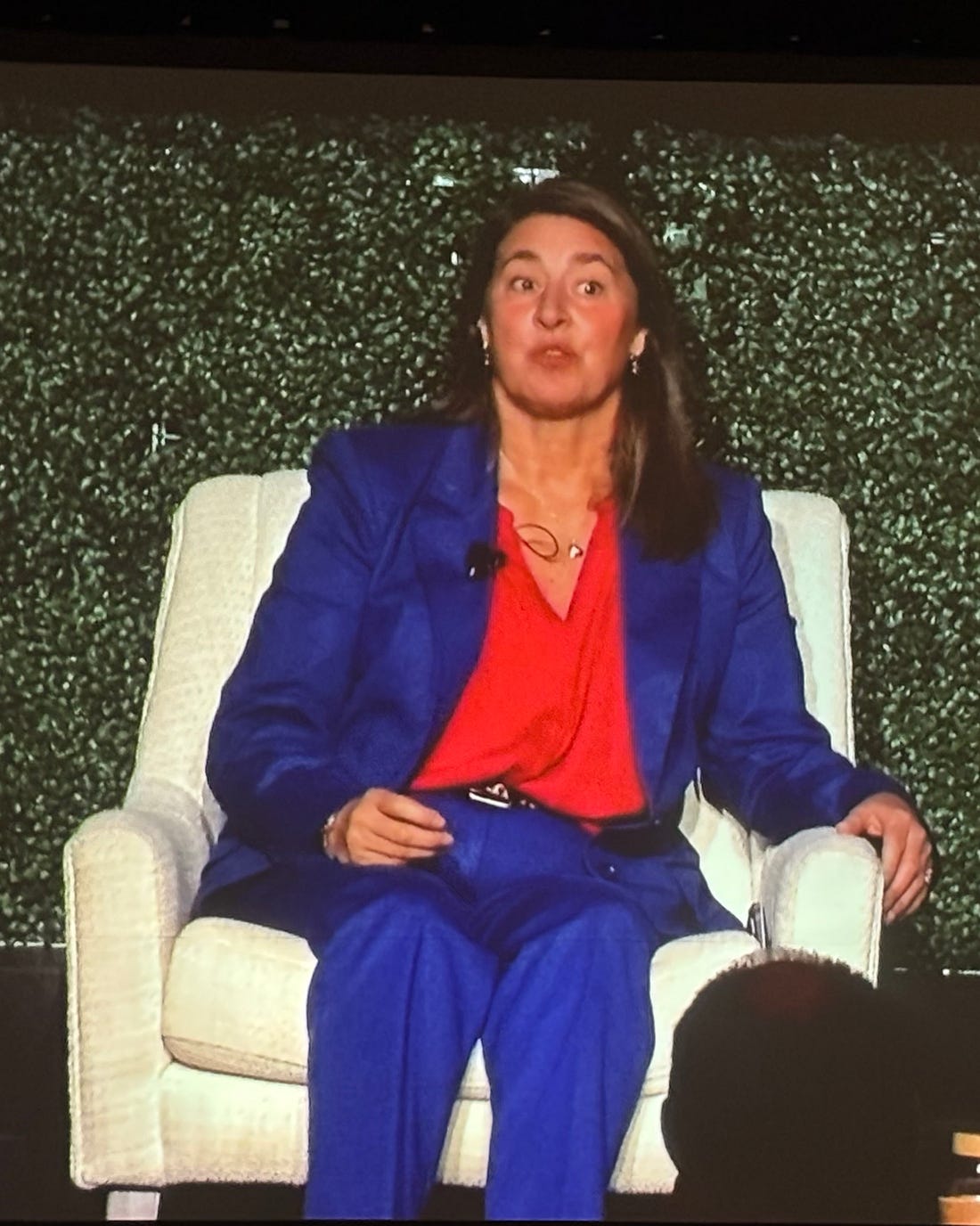
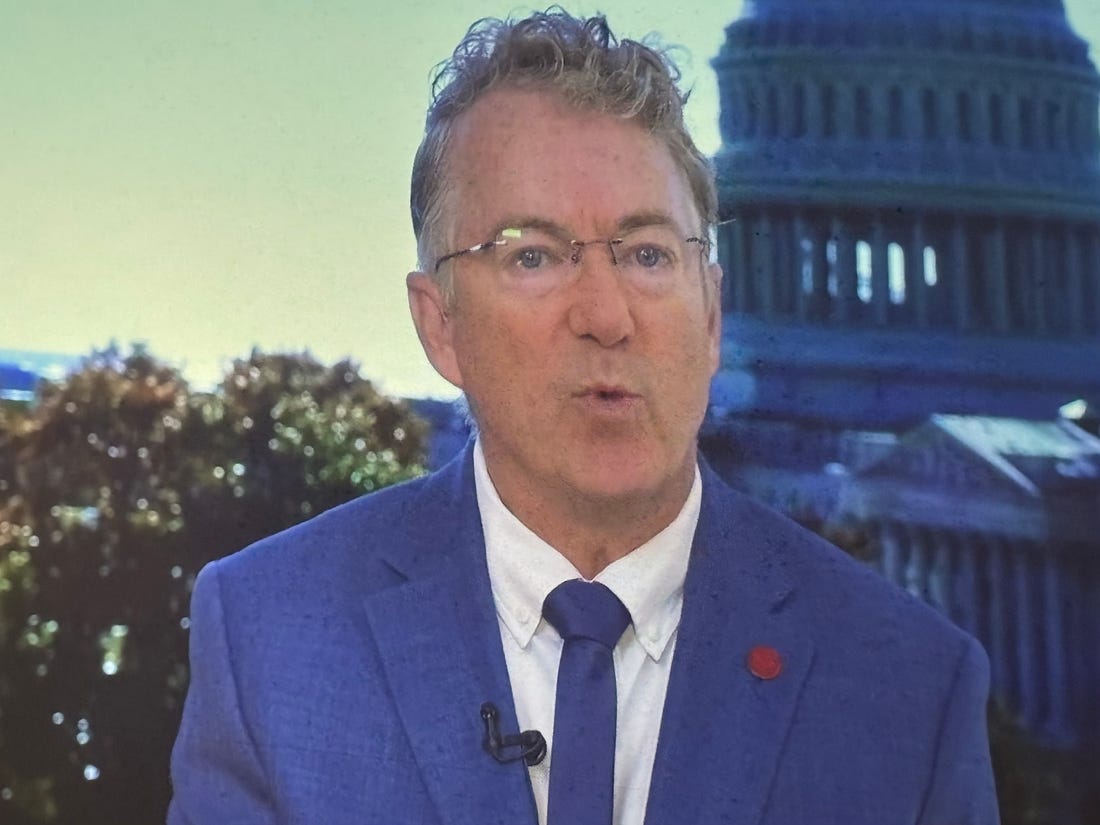
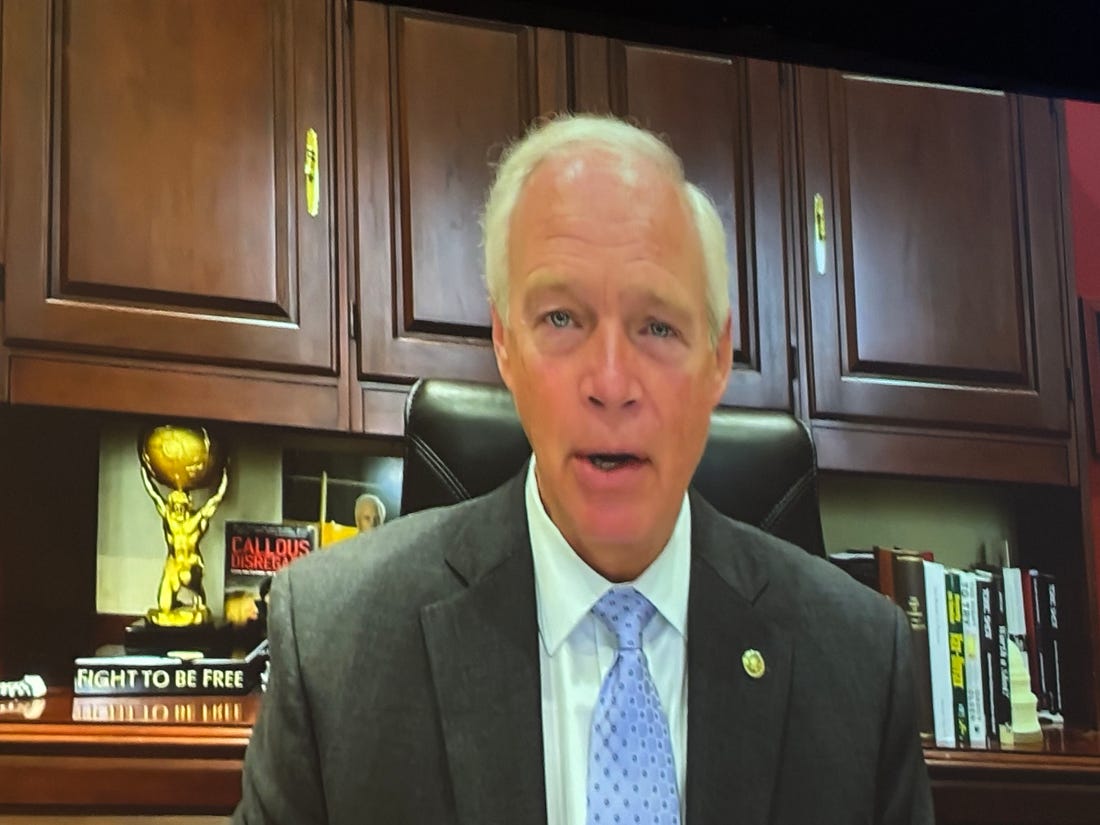
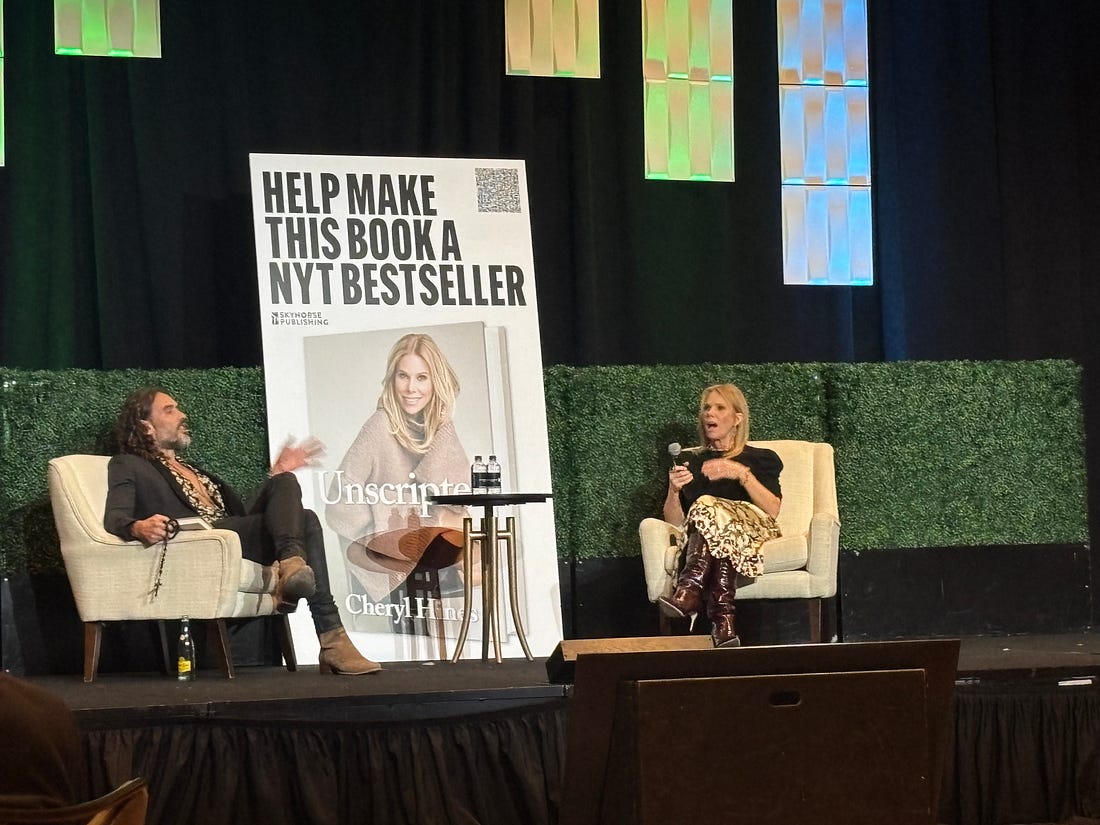





Leave a Reply
You must be logged in to post a comment.